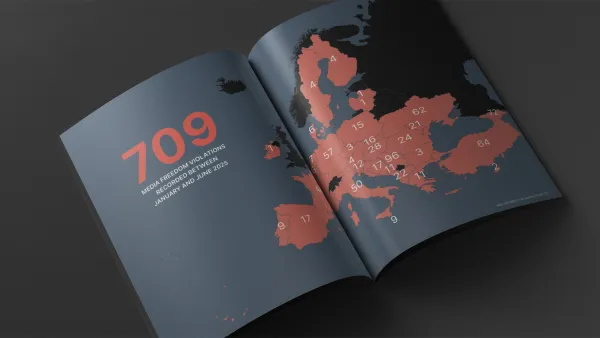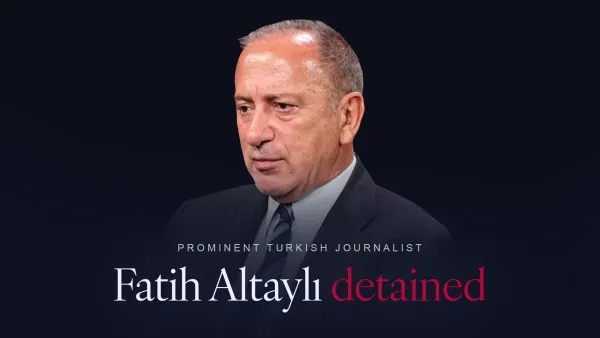The latest Media Freedom Monitoring Report by the Media Freedom Rapid Response (MFRR) consortium highlights a troubling decline in press freedom across European Union (EU) Member States and candidate countries.
In 2024 alone, 1,549 violations affecting 2,568 journalists and media-related entities were documented across 35 countries.
Turkey stands out as one of the most dangerous environments for media workers, with widespread legal harassment, censorship, and state-orchestrated intimidation. The findings reveal an alarming pattern of blocking journalistic activity, intimidation, and legal threats, demonstrating a systematic attempt to silence independent voices.
Particularly concerning is the high number of arrests and imprisonments in candidate countries, with Turkey and Georgia leading in state-led crackdowns against journalists.
Beyond individual country reports, the MFRR’s thematic analysis underscores the broader threats to media freedom, including the rise of deep fake-driven spoofing attacks, election-related restrictions on independent reporting, and growing risks for journalists covering environmental issues. The increasing role of state actors, including police, security forces, and judicial institutions, as perpetrators of media suppression is a dangerous trend that sets candidate countries apart from their EU counterparts. As Turkey continues its descent into authoritarian media control, the need for stronger international advocacy and solidarity with independent journalists has never been more urgent.
The state of media freedom in Turkey remains dire, as relentless crackdowns on dissent, widespread censorship, and judicial harassment of journalists persist. The latest Media Freedom Monitoring Report paints a bleak picture of a landscape where independent journalism is under siege. The sustained assault on media freedom in Turkey is not merely a domestic issue but a matter of grave concern for democracy and human rights worldwide.
Escalating Legal Repression
The most common method of suppressing journalistic activity in Turkey is the use of legal instruments to criminalise reporting. According to the report, legal incidents accounted for a staggering 64.4% of all media freedom violations. Journalists face constant threats of arrest, detention, and imprisonment, with at least 128 journalists caught in the web of legal persecution during the monitoring period.
A particularly insidious tool in this crackdown is the ‘foreign influence agents’ bill, which, if enacted, would allow judges to extend prison sentences by up to seven years for individuals deemed to be acting against the "political interests of the state". Ostensibly framed as a measure to enhance transparency, the bill mirrors similar repressive legislation in authoritarian regimes, posing a dire risk to independent journalism and civil society. Although temporarily postponed, its looming threat continues to cast a shadow over media freedom.
Persecution and Physical Threats
Beyond legal repression, journalists in Turkey face severe threats to their personal safety. The report documents at least 11 cases of journalists receiving death threats, with the case of investigative journalist Murat Ağırel being particularly alarming. The use of intimidation tactics, including anonymous online threats and physical violence, fosters a climate of fear that stifles critical reporting.
Journalists covering politically sensitive cases, such as the murder trial of Sinan Ateş, have also been targeted with verbal threats and legal proceedings. The peril is not limited to individuals; entire news organisations are under attack. Kurdish journalists and media outlets, in particular, have faced disproportionate repression, including fatal violence. The tragic deaths of journalists Nazım Daştan and Cihan Bilgin in a suspected Turkish drone strike highlight the extreme dangers faced by those covering Kurdish issues.
Censorship and Digital Suppression
Turkey's government has increasingly resorted to digital censorship as a means of controlling the flow of information. Authorities have repeatedly blocked access to critical news websites and social media accounts. The government-controlled media regulator RTÜK has played a pivotal role in these efforts, shutting down independent stations such as Açık Radyo and imposing broadcast bans on politically inconvenient stories.
The implementation of the disinformation law has further exacerbated the situation. Journalists are being prosecuted under vague charges of "spreading terrorist propaganda" or "insulting the president," curbing any form of investigative reporting that challenges the state narrative. In an environment where digital spaces are shrinking and independent voices are being silenced, the fundamental right to access information is under existential threat.
Sustaining Media Freedom: A Path Forward
Given the grim state of press freedom in Turkey, concerted action is required to push back against this encroaching authoritarianism. Several measures are essential for safeguarding the role of the press and ensuring the public's right to information:
- International Advocacy and Pressure: The European Union, human rights organisations, and media freedom groups must maintain sustained pressure on Turkish authorities to repeal repressive laws and halt judicial harassment of journalists.
- Legal Support for Journalists: Independent legal aid networks should be strengthened to provide rapid support to journalists facing arbitrary detention and legal intimidation.
- Alternative Media Platforms: The rise of digital censorship necessitates innovative approaches to media dissemination, including decentralised platforms, encrypted communication tools, and international collaborations.
- Public Awareness and Solidarity: Turkish civil society must continue to mobilise in defence of media freedom, raising awareness about the impact of repression on democracy and fundamental rights.
The Turkish government’s systematic assault on media freedom is an affront to democracy. Journalists must be allowed to operate without fear of reprisal, and citizens must be granted the right to access diverse sources of information.
If Turkey is to reclaim any semblance of democratic governance, the restoration of media freedom must be a top priority.








